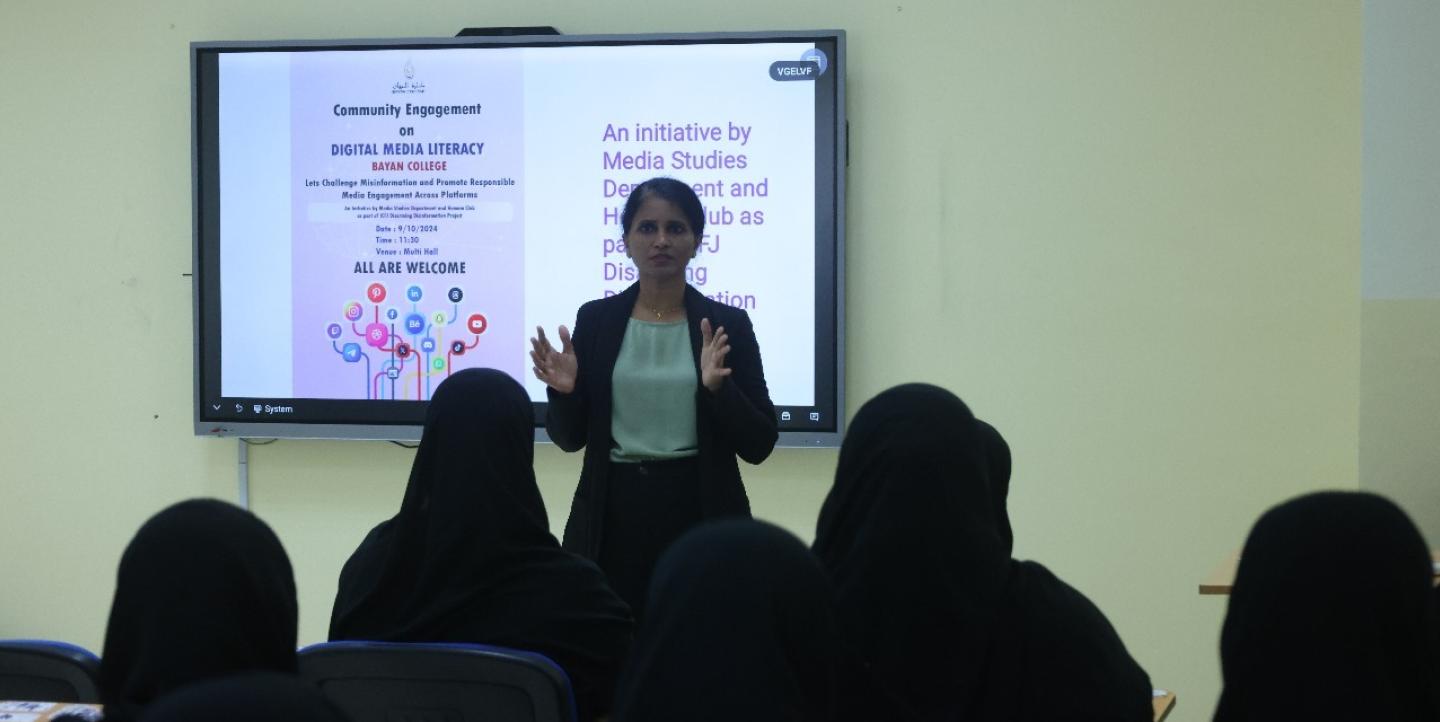O programa Disarming Disinformation do Centro Internacional para Jornalistas (ICFJ) é uma iniciativa de três anos, com apoio do Scripps Howard Foundation, com o objetivo de desacelerar a disseminação de desinformação por meio de estratégias como jornalismo investigativo, capacitação e educação voltada para o letramento de mídia. O ICFJ também fez uma parceria com o MediaWise do Poynter Institute para desenvolver e fornecer programas de letramento de mídia.
O programa para formar instrutores de letramento de mídia recebeu participantes do mundo todo em duas turmas. Os selecionados são líderes comunitários que vão educar as pessoas sobre a importância do letramento de mídia e como aplicar essas habilidades na vida real. O artigo abaixo é uma de cinco histórias de impacto da primeira turma, em comemoração à semana de letramento de mídia.
Em 2018, a Drª. Tamilselvi Natarajan se deparou com um vídeo do sequestro de uma criança, amplamente disseminado no WhatsApp na Índia. O conteúdo desencadeou vários rumores de rapto de crianças no país e gerou episódios terríveis de violência, incluindo linchamentos e ataques em bandos.
No entanto, o vídeo não era de um sequestro real nem havia sido gravado na Índia. Na verdade, era uma campanha de utilidade pública criada no Paquistão que usava a demonstração de um sequestro de criança para conscientizar sobre a segurança infantil.
"Esse incidente me impactou profundamente", diz Natarajan, que à época era professora assistente de mídia em Tamil Nadu, estudo do sul indiano. "Eu tive um sentimento forte de responsabilidade para abordar o problema e fiz questão de falar sobre ele mas minhas aulas."
Educadora de mídia há quase 15 anos, Natarajan teve no episódio o início de uma jornada para expandir seu conhecimento sobre como identificar e desmascarar desinformação.
Ela se candidatou a uma especialização em verificação de fatos através de um programa de letramento de mídia realizado pelo DataLeads, e logo veio a COVID-19. Durante o pico da pandemia, ela viu um conteúdo com informação suspeita, o que a fez colocar em prática o que tinha aprendido.
"Uma postagem viralizou com o contato de mais de cem médicos que poderiam prestar atendimento emergencial", lembra. Ela entrou em contato com cada um deles só para descobrir que nenhum dos números estava correto — eram números que não existiam ou que estavam fora de serviço. "Eu decidi lutar contra isso desmascarando desinformação juntamente com pessoas que pensavam como eu."
Em 2021, junto com Induja Ragunathan, editora do Tamil YourStory, Natarajan lançou o MeiFactory, inicialmente como uma página do Facebook dedicada a desmascarar desinformação ligada à saúde. O MeiFactory evoluiu para um site de verificação de fatos e segue ativo até hoje por meio de contribuições de Natarajan e voluntários. Um ano depois, Natarajan se mudou para Omã em razão de uma oportunidade para lecionar mídia na Faculdade Bayan.
Pouco tempo depois ela descobriu a formação de instrutores de letramento de mídia do ICFJ, realizada em colaboração com a MediaWise. A iniciativa foi criada para aprofundar o entendimento dos participantes sobre redes de desinformação, capacitá-los com as habilidades necessárias para chegar a novas audiências e dá-los conhecimentos sobre novas tecnologias que podem confundir os limites entre realidade e conteúdo manipulado, como inteligência artificial — tudo isso para que na sequência eles possam capacitar outras pessoas. "O programa me apresentou a uma gama de ferramentas avançadas de verificação de fatos que realmente empoderaram os meus esforços", diz.
Como é professora, foi fácil para Natarajan ter acesso ao público-alvo de estudantes e funcionários da universidade para as oficinas de letramento de mídia que ela viria a realizar. Entrar em contato com eles foi fácil; o difícil foi convencê-los de que existia desinformação em Omã. "No começo, eles não tinham muito interesse nas oficinas", diz. "Quando eu passei a incluir exemplos da vida real, principalmente exemplos que eram importantes para o país, as atitudes mudaram."
Natarajan destacou notícias falsas alegando uma invasão de gafanhotos em uma mesquita em Meca, bem como desinformação sobre mudança climática e a prevalência de fraudes financeiras e seu impacto sobre as vítimas.
Estes exemplos atraíram a atenção dos estudantes e os ajudaram a se abrir sobre informações duvidosas que haviam visto online. "Um participante mencionou ter visto uma notícia nas redes sociais que falsamente afirmava que uma variante do coronavírus causava infertilidade nas mulheres", diz Natarajan. "Na realidade, foi demonstrado que essa informação era falsa."
Uma barreira que Natarajan enfrenta nas oficinas é o idioma. Ela realiza as atividades em inglês para uma turma cuja língua principal é o árabe. "Eu tinha um instrutor comigo que traduzia alguns conceitos em árabe", diz. "Também criei um vídeo curto em árabe para aprimorar o impacto da oficina."
Ela elaborou um formato interativo, com os estudantes discutindo os desafios enfrentados para convencer outras pessoas — principalmente os pais — de que certas notícias estavam erradas. Após as oficinas, os participantes sugeriram oferecer a capacitação exclusivamente em árabe para os pais e parentes mais velhos, a fim de ajudá-los a entender o impacto que a desinformação pode ter em suas vidas. "Esse comprometimento coletivo no combate às notícias falsas sublinha a importância de fomentar uma comunidade informada e criticamente engajada", diz.
Para aproveitar o embalo das oficinas, Natarajan, com o apoio da Faculdade Bayan, criou um clube de letramento de mídia no qual os estudantes agora são quem realizam discussões, organizam oficinas de verificação de fatos, coordenam campanhas de letramento de mídia digital e criam programas externos para estabelecer parcerias com organizações de letramento de mídia.
"Por meio dessa iniciativa, estamos criando um impacto de longo prazo, engajando os estudantes e o corpo docente no debate. Esse alcance mais amplo garante que o letramento de mídia se torne uma parte integral da cultura da faculdade", diz.
No futuro, Natarajan planeja incluir linguagem de sinais nas oficinas para torná-las acessíveis a uma audiência maior. "Ao colaborar com profissionais da linguagem de sinais, eu espero criar um ambiente inclusivo de aprendizado para as pessoas com deficiência auditiva", diz.
O trabalho de Natarajan demonstra que o combate à desinformação é mais que apenas verificar fatos — ele demanda um esforço de toda a comunidade para desenvolver resiliência digital. No centro desses esforços está uma mentalidade crítica. "O pensamento crítico permite que as pessoas analisem e avaliem a informação que chega até elas e encoraja o questionamento da validade das afirmações", diz. "Essa habilidade é essencial não só para o empoderamento pessoal como também para estimular uma sociedade mais informada e responsável."
Renata Salvini e Brittani Kollar contribuíram com o artigo.
Imagem cedida pela Faculdade Bayan.


